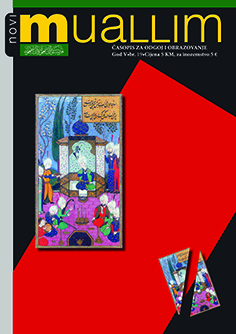INTERPRETATION OF ISLAM IN THE MODERN WORLD – THE COMMUNICATIONAL DISCOURSE
DOI:
https://doi.org/10.26340/muallim.v5i19.1233Abstract
The article discusses possibilities of, qualitatively and methodologically, new interpretation of Islam, capable of adequately fulfilling the specific spiritual needs of the modern man. In the first part of the article the author discusses some of the important intellectual standpoints of the contemporary western thinkers which are indicative of the prevalent spiritual, cultural and ethical disorientation of the modern man. Technological revolution, consumerism, psychological deformations and pathological phenomena, like the widespread phenomenon of boredom, are some of the important characteristics of the modern life. An irrational side of human existence is unsatisfied and neglected. It reemerges from human existence with demands in the form of ultimatum. It basically lacks the true peace and happiness, both of which are unattainable through the union of spiritually free ratio and unselectively praised technology. This opens the path to religion and traditional teachings about life and man. Islam, as the author demonstrates with several examples, posses a unique and authentic culture and ethical dimension appropriate to the needs of the modern man. Today, the Islam’s universal message can and should be presented using classical and modern media, applying the rules and principles of modern communication. Without applying these rules all forms of presentation of Islamic values will lose their vitality and purpose. Whether it be verbal presentation (khutba), audio-visual broadcast (radio and TV), electronic and interactive communication, the Muslims must learn the basic postulates of modern communication. In part, the article also echoes the recent calls for the scientifically radical change in approach to religious journalism.
Downloads
Published
How to Cite
Issue
Section
License
Naknada:
a. Časopis ne naplaćuje naknadu za obradu članaka (APC) i naknadu za podnošenje članaka.
Autori koji objavljuju u ovom časopisu pristaju na sljedeće uvijete:
- Autori zadržavaju autorska prava i pružaju časopisu pravo prvog objavljivanja, pri čemu će rad jednu godinu po objavljivanju biti podložan licenci Creative Commons imenovanje koja omogućuje drugima da dijele rad uz uvijet navođenja autorstva i izvornog objavljivanja u ovom časopisu.
- Autori mogu izraditi zasebne, ugovorne aranžmane za ne-ekskluzivnu distribuciju rada objavljenog u časopisu (npr. postavljanje u institucionalni repozitorij ili objavljivanje u knjizi), uz navođenje da je rad izvorno objavljen u ovom časopisu.


